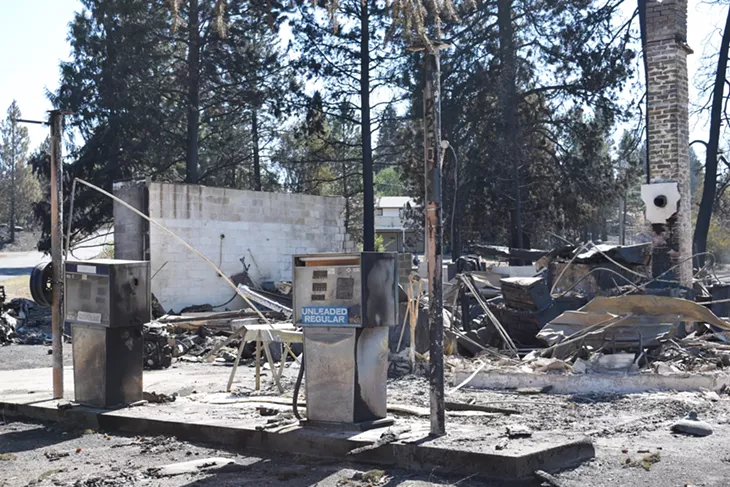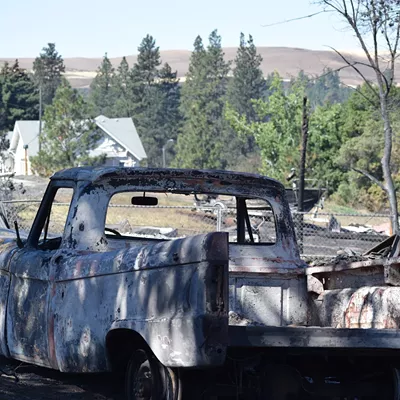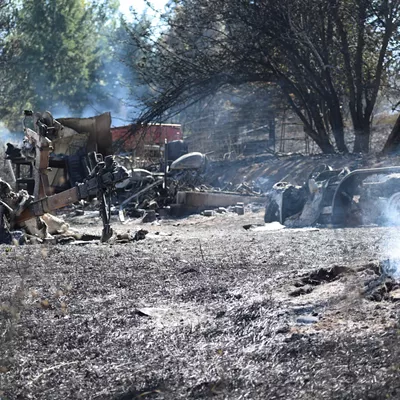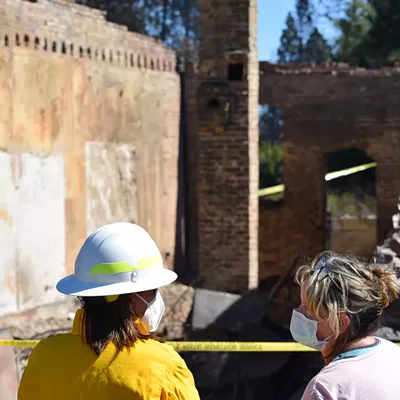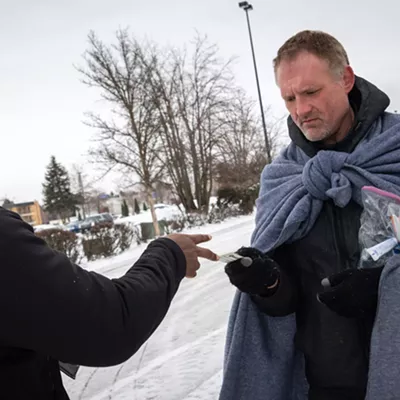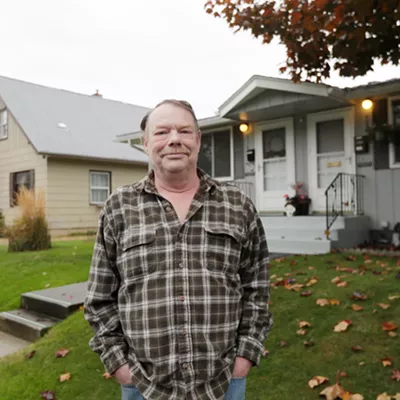
Something isn't right. Late Monday morning, as Alfredo Castillo tends to the chickens at the farm where he works, he can smell it. Across the creek, in the pine trees beyond the field to the west, smoke ripples into the sky.
Something isn't right, Castillo thinks again. The wind is gusting, directing the fire southwest where just four miles away, in Malden, his wife and two kids are enjoying Labor Day at home.
Something isn't right.
"Honey," he tells his wife, Maria Castillo, who recalls the phone message he left her. "You need to get ready and get out of town."
Near the fire's starting point, Castillo and Allen Widman, his boss at Palouse Pastured Poultry, battle it with a firetruck they had on-hand at the farm. They stop the flames just 10 yards from Widman's home, but it's clear that the fire has plans elsewhere, that it's destined for devastation. While there aren't many trees in the rolling hills and farmland of the Palouse, there's a thin forest of pine trees lined up around Pine Creek, which can be followed from near Widman's farm all the way down to Malden, a town of some 200 people in Whitman County. The trees are the fuel. The unusual northerly wind is the engine. And the creek is the road of destruction pointing directly at Malden.
The fire moves fast — faster than a wildfire should. Josh Adams, from Malden, drives into nearby Rosalia for some essential groceries, noticing some smoke over the hill on the way there. By the time he drives back 15 minutes later, there's a wall of flames as far as he can see. They follow him home, where he finds his wife in the driveway watching the trees on the hill above burst into flames. Meanwhile, Chris Ferrell, the town's mayor, left town for 20 minutes because of work, and when she came back, sheriff's deputies had blocked the way in.
Around noon, seeing smoke in the distance, where her husband is, Maria Castillo knows it's time to leave. She stuffs everything she can into the car — pictures with the kids, a lockbox, her son's school book, blankets. But seemingly within minutes, the smoke rounds the corner near the house, the sun turns dark red and the air becomes suffocating.
Sheriff's deputies, whose flashing lights can barely be seen through the smoke, blast orders to evacuate through a speaker. Maria and her two kids — 3 and 7 — get in the car and out of town, only for her 7-year-old to realize that he left his dog, a chihuahua mix named Toto, behind.
It's too late to go back.
The firefighters can hardly keep up. Across the region, across the state and the entire West Coast, wildfires are already filling the atmosphere with smoke. In Eastern Washington, the gusty wind following a dry spell created the perfect conditions for a disastrous fire.
The fire headed toward Malden on Sept. 7 is the third one of the morning for Spokane Fire Chief Brian Schaeffer. Around 11 am, he's driving to Colfax to bring resources for a fire threatening homes there when he gets word of another fire also near Colfax. Then another, at 11:58 am: There's a fire behind a residence off of Babb Road, the call says. Malden is in danger. Schaeffer takes over as incident commander, but he knows they're overmatched.
"I don't think there was ever a point we didn't feel like we were likely going to have a loss of life in this experience," he says.
As some firefighters stay to protect Colfax, Bill Tensfeld, the director of emergency management in Whitman County, rushes toward Malden along with several fire trucks. Tensfeld gets there in 20 minutes, but the fire is already there — flames are bursting 40-50 feet in the sky, torching trees and swarming homes.
"It was like an inferno," Tensfeld says.
It's not a fire they could fight. Due to the high winds, it was too dangerous for aircraft to help out. Even if there were aircraft and 100 fire trucks, firefighters say, the fire would be unstoppable.
But they can save lives. Orlando Sandoval, deputy fire chief of Spokane County fire district 10, rushes in from Medical Lake to help evacuate Malden once he hears the call. Passing by the thick cloud of smoke billowing from the trees near Widman's farm off of Babb Road, he continues on to where he knows the fire is headed. When he reaches Malden, a wall of flame blocks him from reaching the east end of town. He turns around, but he's cut off by more fire and smoke. Trapped by fire and smothered in smoke, he looks for a spot already burned, then parks his three-quarter-ton Chevy there, waiting for the fire to pass.
A fire engine comes through, and the firefighters in it ask Sandoval where to go. "Just keep going west and see what you can do," Sandoval says. But they're out of water. Another truck nearby runs out of water as well, and the firefighters ask for Sandoval's help in finding two people near the post office. The smoke is so thick that he can't even see the road in front of him. He can't find the people, but then a small car with a pregnant woman pulls up. She's asthmatic and can't breathe. Sandoval has an ambulance meet them and they get out.
He calls incident command.
"We've got about 70-80 percent of the houses on fire in Malden. We need to get everybody out and see what resources you can send here," he recalls saying.
The scene is apocalyptic. Mike Melcher, a Whitman County Sheriff's deputy among the first to arrive in Malden and help with evacuations, looks down Main Street. The post office, the fire station and City Hall are all burning down. The ground is hot. Power lines are popping. Trees are falling. The city is lost.
It's time for him to evacuate, too.
Two days later, on Sept. 9, Malden still smolders. Thankfully, there are no fatalities. But lives were upended. Entire homes — 121 of them — are reduced to ash and rubble by this fire. Eight commercial properties and 94 other structures are destroyed. All this damage in one afternoon, from one fire that Tensfeld estimates took roughly three hours to burn 13 miles from Babb Road through Malden and Pine City.
"That's crazy to see a fire move like that," Tensfeld says.
Nobody knows how the fire started.
In the charred mess of things that used to be their home, Alfredo and Maria Castillo are back with their kids, looking for Toto. They only have sandals, and Maria accidentally steps on a nail. Alfredo stands on the edge of the house's foundation, surveying the black hole where their kitchen and living room used to be. "Maybe Toto jumped in the truck?" Maria asks, wishfully, pointing to the fire-stained pickup. Toto is nowhere to be found.
They reminisce about their home and the porch where they enjoyed the sunset, where they looked out at the birds, the deer, and the kids on the playground. They rented this house, and now they don't know where they're going to live or what they're going to do next.
"It hurts," Maria says. "It's shocking. But most of all, it hurts so bad."
The residents of Malden, a short drive from Spokane, usually don't mind being overlooked. It's part of the appeal: It's an hour from anywhere but an hour from everywhere. Some people here work at a farm. Some moved here because they can buy a beautiful property for a reasonable price. Some just hated living in Spokane.
Kellie Brown, watering her garden down the hill from the Castillos, has lived here for 31 years. She bought the house cheap, and it's still standing — likely because she waters her garden so much, she says. She stayed in Malden all this time because it's where she raised her children. It's where she takes care of the churchyard. It's home. But now, two days after a fire destroyed the town, she wonders how it will go on.
"I think this is gonna be the end of us," Brown says. "I think they'll end up unincorporating or something. I don't know. It depends on the people, how bad they want to live here, I guess."
The next two days, politicians come into town, promising to help Malden rebuild. Hilary Franz, the state's commissioner of public lands, tours the town with Malden's mayor, Chris Ferrell. They hug and they cry. Ferrell, whose home was somehow saved, says Malden never had a chance. Franz agrees, and she tells the Inlander that there are "thousands" of towns in Washington that could be quickly decimated by wildfires just like Malden. She demands more resources to manage forests, and she wants to create a "defensible space" around small Washington towns to make them more resilient in the future.
"One of the ways I look at it is, ideally, in a community it wouldn't be homeowner by homeowner. A community would come together and say, 'We're never going to have this happen again,'" Franz says. "Our agency is ready to partner and work with them and say, 'What would it take to help this entire community be resilient to fire?'"
The next day, Gov. Jay Inslee comes into town, looking very much like an ex-presidential candidate with his blue jeans, button-up shirt and Washington State University Cougars mask. In a speech to a small crowd — some wearing MAGA hats, others with flags for Inslee's gubernatorial opponent Loren Culp — he says, "We're going to do everything in our power to help Malden come back." He's providing cash assistance for displaced families. He says he looks forward to coming back next year and taking a bike ride on a new trail run, adding that "this is gonna be a great tourist destination next summer."
If you would like to help the Castillos and Grahams recover from the wildfire, you can find them on gofundme.com.
But these aren't just wildfires, Inslee says. They're "climate fires." It's a new Washington, where these explosive wildfire seasons are no longer the exception. The drier grass and trees are "fire bombs" that need to be removed, he says, because otherwise no fire department will be able to protect a town like Malden.
"When you've got 8 percent humidity, it's a high temperature and your winds are blowing 50 to 60 mph, there's no human force on Earth that can protect us from these fires," he says.
Matthew and Jessica Graham watch him, their 10-year-old daughter at their side. The Grahams, a family of seven, were in Post Falls visiting relatives as the fire roared through on Labor Day. Now, they've lost everything.
When Inslee's finished, they walk down the road, past the lot where City Hall used to be, past columns of smoke still rising from the ground. They find their other four kids rummaging through a pile of burnt metal and ash, their first time back home since the fire. In the rubble, they treat everything they find like a lost treasure. "There's the playground!" they say. "This is the fridge!" They don't care what it is. They just want to find something familiar.
For Matthew Graham, the father, the hardest part has been losing the things he overlooked, the things he took for granted. It's something small that reminds him that everything has changed, and it may not ever be the same.
"What really threw me for a loop was like, Tuesday morning, we spent the night at my in-laws', and I woke up in the morning and my feet were cold. And then it dawned on me, that like, I don't own any socks," Graham says. "And there have just been times with these little things that you want, and then you realize, it's all gone." ♦

